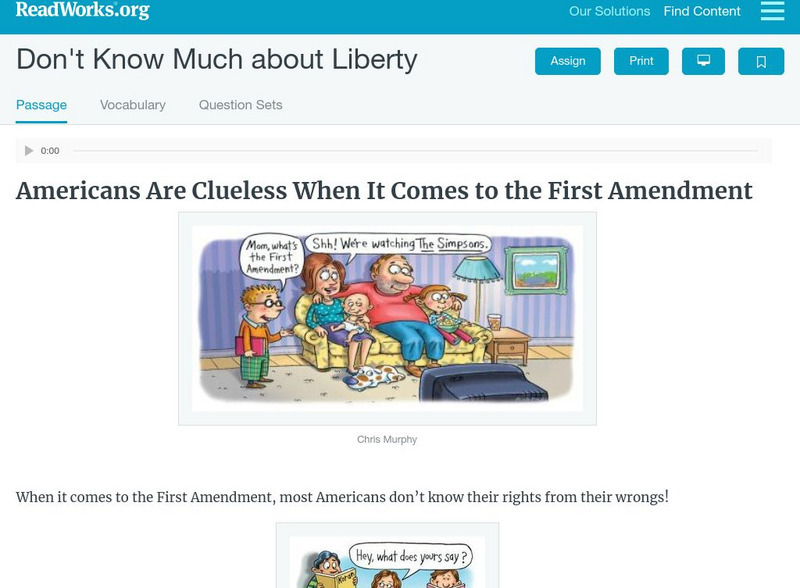Hi, what do you want to do?
Curated OER
Arrest
Students become active participants in the legal process as they take on the roles of witnesses, jurors, and defendants in a trial simulation. An understanding and appreciation of the legal system is fostered through the experience.
Roy Rosenzweig Center for History and New Media
Reward: Valuable Slaves
To gain insight into the American institution of slavery and how African Americans were viewed during this time, groups examine run-away slave ads and slave auction broadsides. Teams use the provided worksheet to record their impressions...
Curated OER
Cartoons for the Classroom: Bill of Rights Day
In this current events activity, students analyze a political cartoon about the Bill of Rights and respond to 3 talking point questions.
Curated OER
Rome: Republic to Empire
Sixth graders discuss the rise of Rome from a republic to a dictatorship. In small groups, they role-play as congress people debating whether or not to give the president more powers. In another activity, 6th graders produce television...
Curated OER
Individual Rights -- Freedom of Speech at School
Students examine their individual rights at a public school. In groups, they identify the most common ways of expressing themselves and why they should limit their speech in public. They compare and contrast two cases in which they...
National First Ladies' Library
Science: The Purloined Letter
Students examine Edgar Allan Poe's "the Purloined Letter" from the perspective of a profiler. To sharpen search procedures, they examine the text and make lists of items and places in the house that were searched. Then students discuss...
Curated OER
Social Studies: Ramadan Observance
Young scholars discuss Ramadan and the practice of fasting. Working in groups, they visit Websites and complete worksheets about the Muslim holiday. Students write letters role-playing as someone unfamiliar with a celebration and then...
Curated OER
Who or What is Un-American?
Young scholars explore concepts about civil liberties, research the history of sedition-related legislation in the U.S. and create a position paper on the topic.
Curated OER
Citizenship Worksheet 1 - The Rights and Responsibilities of a United States Citizen
In this United States citizenship activity, students learns the qualifications for U.S. citizenship, the rights of that citizenship as well as the responsibilities therein.
Curated OER
Seeing the Other Side
Students examine the concept of justice. In this fairness lesson plan, students explore just and unjust activities they have observed in the world. Students attempt to look at both sides of stories.
Curated OER
U.S. President: Facts
Young scholars gather information from a chart. They become familiar with the names of the presidents of the United States. They complete a worksheet imbedded in this plan on the many facts associated with the Presidents.
Curated OER
A Day in the Life of Parliament
Tenth graders watch excerpts from a parliamentary session, assume membership in a political party from a fictitious country and conduct a parliamentary session of their own covering a range of topics of current relevance.
Curated OER
Roaring Twenties: The Impact of High School on its Students Over Time
Eleventh graders compare the American high school experience of the 1920's to today. In this historical perspectives instructional activity, 11th graders examine surveys from 1924 high school students and then create their own surveys...
Curated OER
The Cuban Revolution
In this Cuban history worksheet, students respond to 8 short answer questions about the Cuban Revolution and the American response to the conflict.
Curated OER
We Accuse Colored Peoples of California V. State of California
Pupils participate in a WebQuest to investigate discrimination of African Americans, Chinese and Californio/Latino during the Gold Rush era. They act as law clerks to write a letter to their clients about a potential trial.
Curated OER
The Great Debate Lesson Plan: Slavery in the U.S. Constitution
Students examine the U.S. Constitution to see what has been writte about slavery. Then, students, in groups, research the Constitutional Convention of 1787 to explore slavery compromises.
Curated OER
State of Oregon v. Dominguez-Martinez
Students are introduced to the concept of racial profiling. In groups, they analzye the case between Oregon and Dominguez-Martinez and evaluate the use of racial profiling as a tool of policemen. They also discuss the laws in place to...
Curated OER
Human Rights : Historical Process towards Individual Application
Students compare governments as they relate to human rights of its citizens.
Curated OER
The Real Work is Done in Committee: A Simulation
Students research the Canadian federal legislative process, and identify the main features of local, provincial, and federal governments in Canada. They simulate the process of a bill going through the legislative process.
Curated OER
VS.6b
Sixth graders explore, analyze and identify the ideas of George Mason and Thomas Jefferson as expressed in the Virginia Declaration of Rights and the Virginia Statue for Religious Freedom. They list and declare the responses stated in...
Constitutional Rights Foundation
Constitutional Rights Foundation: Are Bible Readings Ever Allowed in School? [Pdf]
Article on the consitutionality of prayer, worship or reading the Bible at school. Students analyze Supreme Court cases, answer questions for discussion and debate the protective clause of first amendment rights.
National Endowment for the Humanities
Neh: Edsit Ement: The First Amendment
This resource presents lessons on the First Amendment. It contains many resources for use with children, and links to primary source documents.
Read Works
Read Works: Don't Know Much About Liberty
[Free Registration/Login Required] Students read about the freedoms guaranteed by the First Amendment to the Constitution. A question sheet is available to help students build skills in classifying and categorizing.
Other
Freedom Forum: First Amendment Struggles & Triumphs
Find out how the First Amendment serves citizens in real life by reading about Daniel Ellsberg, Mary Beth Tinker, and Alton T. Lemon, all of whom were principal litigants in landmark Supreme Court cases regarding the freedom of expression.

























![Constitutional Rights Foundation: Are Bible Readings Ever Allowed in School? [Pdf] Article Constitutional Rights Foundation: Are Bible Readings Ever Allowed in School? [Pdf] Article](https://static.lp.lexp.cloud/images/attachment_defaults/resource/large/FPO-knovation.png)
